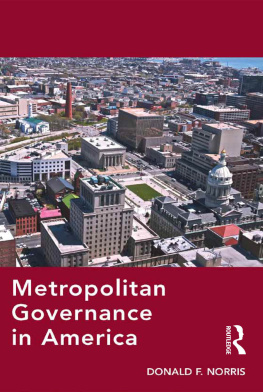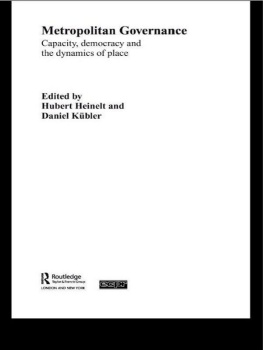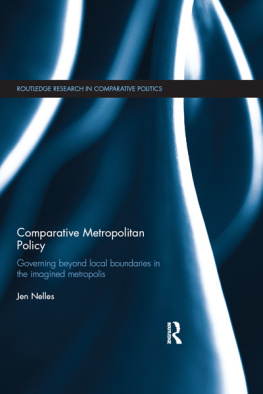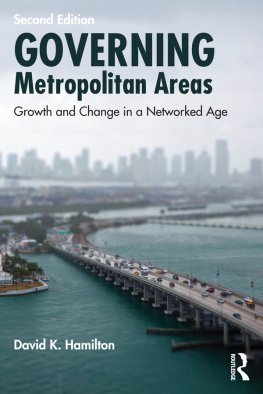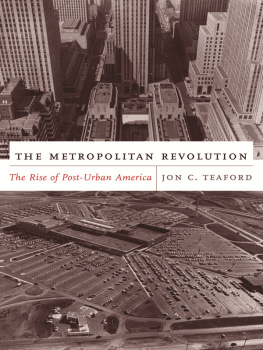First published 2015 by Ashgate Publishing
Published 2016 by Routledge
2 Park Square, Milton Park, Abingdon, Oxon OX14 4RN
711 Third Avenue, New York, NY 10017, USA
Routledge is an imprint of the Taylor & Francis Group, an informa business
Copyright Donald F. Norris 2015
Donald F. Norris has asserted his right under the Copyright, Designs and Patents Act, 1988, to be identified as the author of this work.
All rights reserved. No part of this book may be reprinted or reproduced or utilised in any form or by any electronic, mechanical, or other means, now known or hereafter invented, including photocopying and recording, or in any information storage or retrieval system, without permission in writing from the publishers.
Notice:
Product or corporate names may be trademarks or registered trademarks, and are used only for identification and explanation without intent to infringe.
British Library Cataloguing in Publication Data
A catalogue record for this book is available from the British Library
The Library of Congress has cataloged the printed edition as follows:
Norris, Donald F.
Metropolitan governance in America / by Donald F. Norris.
pages cm
Includes bibliographical references and index.
ISBN 978-1-4094-2192-4 (hardback) -- ISBN 978-1-3155-9513-9
(ebook) -- ISBN 978-1-3170-9693-1 (epub) 1. Metropolitan government--United States. I. Title.
JS422.N67 2015
320.850973--dc23
2015006540
ISBN: 978-1-4094-2192-4 (hbk)
ISBN: 978-1-3155-9513-9 (ebk-PDF)
ISBN: 978-1-3170-9693-1 (ebk-ePUB)
Preface
This book is the culmination of a very long journey that began in the late 1960s at the University of Virginia. It was then that I took a course on urban politics as part of my graduate studies in political science in the Woodrow Wilson Department of Government and Politics at UVA. There, for the first time, I was exposed to the writings of the Metro Reformers and their calls for serious governmental reform in Americas metropolitan areas to deal with suburban sprawl, governmental fragmentation and the negative externalities of both that were affecting those areas and their residents throughout the nation. Naively, and more or less uncritically, I accepted the Metro Reformers writings at face value and wondered why in the world the governments and residents of our metropolitan areas were refusing to heed the Metro Reformers warnings and recommendations.
Had I only paid more attention when I was growing up in a rural town a few miles east of Rochester, New York, in the 1940s and 1950s, I might have known the answer. It turns out that my parents and our neighbors were part of the problem. In 1946, Charles Norris (a Second World War Veteran) and his wife Nina (and I), moved into a rented apartment in a house owned by a local farmer on Drum Road in the Town of Webster for a short stay while waiting for their house on Klem Road, a mile or so away, to be built. The house, into which they (and I) moved in 1947, was on 30 acres of what had been a farm that was bounded by Klem Road to the south, the tracks of a spur line of the New York Central Railroad to the north, Van Alstyne Road to the east, and the Hembrook farm (around 50 acres) to the west. Except for their small, one-story, two-bedroom, one-bath house and a small barn behind it, there were no other structures on their land.
In the late 1940s, the Town of Webster was almost exclusively rural, with numerous fruit orchards, farms and dairies, the small, incorporated Village of Webster and the even smaller unincorporated hamlet of West Webster. In 1940, the Town population (including the Village) was 5,250 souls. By 1950, although the population had risen by more than one-third (36.6 percent) to 7,174, Webster remained mostly rural. Within a short time, however, Websters rural character began giving way to that of a burgeoning bedroom suburb of Rochester.
My parents helped facilitate this transition by subdividing a sizeable portion of their 30 acres and selling individual building lots of an acre or two, which were nearly all snapped up by the mid-1950s, mainly by families moving out of Rochester. These newcomers to Webster wanted green spaces, good schools and safe neighborhoods for their kids and themselves and, of course, lower taxes. They also wanted nothing more to do with the problems of the city that they had just left. Between 1950 and 1960, Websters population more than doubled (129 percent growth), ballooning to 16,434, and the Town was having difficulty keeping up with the demand for public services, especially schools.
In subsequent decades, the Towns population continued to grow with farm after farm and orchard after orchard growing houses instead of fruit and vegetables. By 2010, the Town population was 42,641, a six-fold increase (494 percent) over 1950. Websters transformation, of course, was replicated throughout urban America during the decades following the Second World War.
A few years after completing graduate studies and still enamored of the Metro Reformers, I served as a consultant to a local television station in Grand Rapids, Michigan, in the production of a six-part documentary At Issue: Metro Consolidation. Needless to say, the documentary repeated many of the Metro Reformers warnings and recommendations. Later, I led an effort through a business organization in Grand Rapids to secure an amendment to the Michigan state constitution that would permit county home rule. After three years of getting nowhere and in the face of opposition from just about every political source in the state, we gave up. Nevertheless, and even with this dose of political reality, I continued to wonder why, if things were as bad as the reformers said, local governments and their residents did not embrace reform. Clearly, the lessons that I should have learned in Webster continued to elude me.
Owing to changes in my career trajectory, I moved away from urban studies for a number of years, returning to the field in the late 1980s. As I began reacquainting myself with the issue of metropolitan governance, I came across the early works of the New Regionalists. Their argument, upon which I will elaborate in greater detail in , is that local governments in metro areas are impelled by forces beyond their control to cooperate with one another in order for their regions to be economically competitive in the global economy. I was then, and to this day remain, skeptical of this line of argument, but still I wondered if there was any truth to this argument, why did local governments not seem to be any more cooperative with one another than they were prior to the arrival of the New Regionalists?
As I continued reading and re-reading works on metropolitan governance, I began to think about research questions on this subject and also about ways in which I could contribute to this field of scholarship. As a result, since the early 1990s, I have conducted considerable research into and have written a number of journal articles, book chapters and conference papers about metropolitan governance, both in general and also tied to specific locationsthe Baltimore, Maryland region, two conurbations in England and a comparison of metro governance in the US and Poland.

